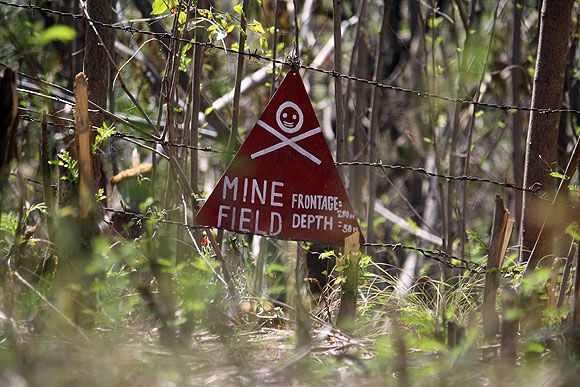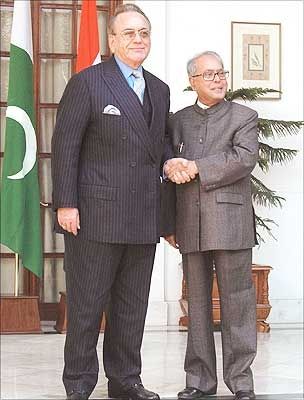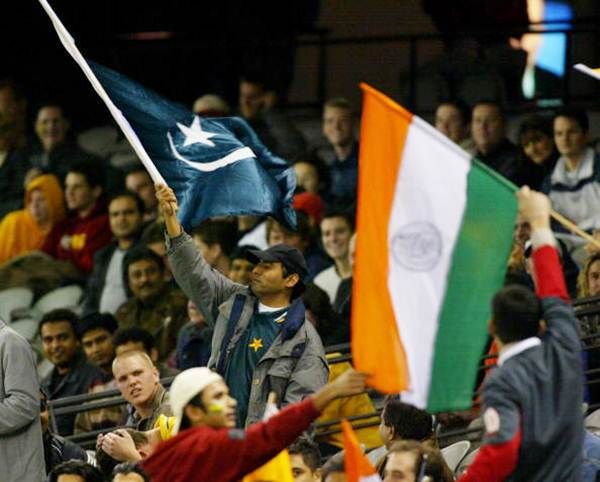
'The people of Pakistan and India will begin to understand what the bottom lines are. What India can accept maximum is known to Pakistan. What Pakistan can accept minimum is known to India.'
'In the absence of atmosphere you can't even talk, you can't think of writing agreements and frameworks. You have to have the right atmosphere. With the previous BJP government it had started and I hope the new BJP government will continue with that.'
Former Pakistan foreign minister Khurshid Mahmud Kasuri tells Sheela Bhatt/Rediff.com how close Pakistan and India came to securing a peace agreement.
Mani Shankar Aiyar, the former diplomat turned politician, vocal Congress leader and his old buddy from Cambridge (Trinity Hall, 1961 to 1963) Pakistan's former foreign minister Khurshid Mahmud Kasuri are keeping India-Pakistan talks alive.
Kasuri visited India last week to participate in a Track II meeting of India-Pakistan delegations that he heads with Aiyar. Pakistan's Regional Peace Institute and the Hans Seidel Foundation sponsored the meeting.
Kasuri was also promoting his book Neither a Hawk Nor a Dove -- an insider's account of Pakistan's foreign policy. Pakistan's foreign minister between 2002 and 2007 Kasuri navigated secret talks with India with the backing of his boss, then Pakistan president General Pervez Musharraf.
The first of a two-part interview with Sheela Bhatt/Rediff.com
Sir, you've said that you are neither a hawk nor dove. What is your identity?
You don't have to be a hawk. I am a normal human being. I don't have to be classified. I don't like labels. Humans are not a mass product that you have to have a label on you. I react according to situations.
In the context of Pakistan and India, I want peace. I think peace is in the national interest of Pakistan and I know a large number of educated, experienced, good and patriotic Indians who feel it is also in India's interest to have peace with Pakistan, peace in the neighbourhood so that India can leverage its advantages in the area.
I think it is mutual benefit and I don't wish to be classified either as a hawk or a dove.
You have been foreign minister, you've seen it all. What is the bottom line for Pakistan and India in this relationship?
My book will give out the details, the reasoning and the background. Why were we doing all this, what were the factors? It's all being brought out in a book. I think one advantage of that would be, whether people like it or not, it will be on record. So far nobody has brought it out on record.
So people in both States would know each other's bottom lines because they are privately negotiated. For the people of Pakistan and India, that's more important. They will begin to understand what the bottom lines are. That there is no poker game.
What India can accept maximum is known to Pakistan. What Pakistan can accept minimum is known to India.
So when that is known, it's not like a game of holding cards and bluffing. There is no bluffing really required between India and Pakistan. So if I can serve that purpose, then it'll be useful. And it does not mean that people can't change their positions.
People can always change their positions. But if they change their positions, at least it will be known that this is what they had agreed to and if it was agreed to at one time, it can agreed to at another because this is a reasonable thing.
If you want peace in the region, then any agreement will have to be accepted by a majority of Kashmiris, Pakistanis and Indians. So that it will serve as a benchmark. So whenever there are statesmen at helm in both countries, they will go back to what was once agreed to.
What is the minimum that Pakistan looks forward to?
What I have described in the book is what Pakistan and India had agreed in the framework. Then prime minister Manmohan Singh's special envoy (Ambassador Satinder) Lambah had said that the two countries had almost 90 per cent agreed. To which I said 95 per cent. So the basics for the agreement were settled largely.
We came to a conclusion privately in Pakistan that if whatever we agree, if the Kashmiris reject, the people of Pakistan will reject it. So even if we produce a great project, the Kashmiris will say it's useless. If they say it is useless, nobody in Pakistan will accept it.
So I went about finding what they will accept at the minimum. I also had to find out what India will agree to and then what could we sell to the people of Pakistan. So it was like various circles crossing each other and you have to see an area of common agreement.
We don't live in an ideal world. When two sovereign States are involved and the people of Kashmir are involved on both sides of the LoC (Line of Control), my impression was we could sell it to 70 to 75 per cent of the Kashmiris.
You will never have a solution which will be acceptable to 100 per cent of the people. Not possible in Pakistan, India and Kashmir. Even if there is a war and one side decisively wins, even then there is no solution. Why?
The First and Second World Wars proved it. The First World War resulted in the Second World War. So you need a negotiated settlement. You need negotiations which will be acceptable to all.
Which were the forces in operation that didn not help you to reach the logical conclusions of your negotiations?
There were no forces. We were going ahead at full speed. I wish then prime minister Manmohan Singh had come to Pakistan in October 2006, but unfortunately there were elections in India in Uttar Pradesh and a few other states so he couldn't come then. So we agreed on the next date in March 2007.
And unfortunately we had judicial movement so even if the PM had come, he would have signed on Sir Creek which was ready for signature and that would have provided the impetus for the remaining 10, 15 per cent of the differences on Kashmir. We hoped that would happen.
What was the mindset in the two nations?
I am not one of those who feel that they are born to be each other's enemies. I have seen before my own eyes how quickly perceptions change when the peace process is doing well and I was continuing with a positive narrative.
In the Lahore Test, people were running across the fields with Indian and Pakistani flags. I saw it. India won and people clapped. It tells you how much change has happened. I saw it and it can happen.
If soft power is promoted, it will bring our people closer.

How close were India and Pakistan when General Musharraf and Dr Singh were talking?
Pretty close, I think, both on the back channel and composite dialogue. The back channel was meant to deal with more difficult issues like Kashmir. We were also talking about Siachen which was being discussed on the composite channel as well.
Kashmir was majorly being discussed on the back channel because we didn't wish things to leak out as we were only in the process to prepare a framework which then had to be presented to the constitutional authorities of India and Pakistan.
The Indian negotiators had to present it to their Cabinet and Parliament and we had to do similar things. So we didn't wish anything to go out beforehand as we were afraid that there are people who were opposed to peace and there are such constituencies unfortunately in both countries.
We felt there would be negative spin put on whatever we wanted to do. So once the whole package had been arrived at, we felt it has to go to the media, has to go to the public, to the Cabinet, to Parliament.
You can't arrive at a decision in secrecy but you can prepare a framework in secrecy which you think your people, your Parliament will agree to. And that is what the governments of Pakistan and India were trying to do.
We were not trying to bypass any constitutional authority in the process. We couldn't even think of it. But we have to accept the modern reality of spin being more important than news and perception being more important that reality. So we have to live with that. And that was the reason for the back channel.
The Indian side doesn't talk as intensely about these secret talks as you do.
I keep talking. There is a method to the madness. I wasn't doing it without a reason. You know there is this deep seated cynicism that Pakistan and India cannot decide anything bilaterally. They are incapable, they are failures, they need third party intervention.
I used to tell them no, we were talking and we were making progress. And the reason I used to do that, though it provoked people both in India and in Pakistan, because the people in Pakistan who didn't wish to have that sort of an agreement with India were really angry. And some Indians were not happy at all.
So I was doing it to sensitise people so that when it was announced, there was no negative reaction. It was inoculating. I was purposely doing it.
I was committed to the peace process and I didn't want a shock. So I was purposely leaking out something over a period of time. Secondly, the effort was to create a good atmosphere. At which we succeeded.

The cricket match in Lahore is a living example and even the Mohali match was quite pleasantly received here. In Lahore they had Pakistani and Indian flags in their hands and on their cheeks as well. It means that we were succeeding.
Despite the fact that I was talking out of terms and I continue to do so, it was necessary to keep optimism alive.
Why wasn't Dr Singh speaking in a similar way?
He did it in the end when he was about to quit office. He said we were on the verge of a settlement with Pakistan. You look at his statement, he did it in the end. If he had done it in the beginning, it would have been better.
But I was doing it on purpose. I knew the Indians would not do it. Because they thought they understood India better than I could, I couldn't understand the Indian polity as well as the Indian negotiators.
Dr Singh and Lambah understood this better than we did about their circumstances. In my own way I was trying to sensitise the Indian public as well the Pakistani public.
So that settlement was allowing Kashmir to stay with India as it is and the other part of ...
I am not going to answer that, but it was a settlement that... see you should understand that as soon as one side proclaims victory, the settlement is dead. So I am not going to use any such word which gives the impression that one side succeeded and the other failed.
Words need to be used very carefully and in my book this is one major problem I faced.
I read Lambah's speech which he delivered either in Jammu or in Kashmir and I met him after that. I said yes you have an easier job as you are addressing an Indian audience. Mine is a much more difficult job.
I have to address Indians, Kashmiris and Pakistanis and I wish to say the truth, the unvarnished truth, but in more acceptable terms. The idea is not to create a tempest or storm.
The idea is to create greater understanding which is much more difficult because what is acceptable in one country is not acceptable in the other.
Even words have different meanings in both countries.
You do not want to spell out much, but General Musharraf spoke about his six point theory and...
No, he hadn't spelled out much. If you see his book In The Line of Fire there is very little said. For the first time I am going to give the details and...
Whatever he has written doesn't seem acceptable to India.
I don't know what he has written. But what I am saying is based on the truth. It has to be based on truth. And truth is very important. If you sacrifice truth, you can make no progress.
You see truth has one big advantage which history has proven even your detractors can't run you down beyond a certain point. That is the power of truth.
To put the chronology in place, during Mr Atal Bihari Vajpayee's time there were Track 2 talks too. Do you think they were also very close to a settlement?
We started this process with Vajpayee and that is why I paid him a complement because the most successful process between the two countries ever was started by him in 2004. In fact when they (the Vajpayee government) lost the elections, we were very apprehensive in Pakistan.
We didn't even know whether the Congress would accept what the old government had done. We had invested a lot of time and effort in Vajpayee, (then national security advisor) Brajesh Mishra and (external affairs minister) Yashwant Sinha.
What kind of progress was made at that time?
First of all, we had agreed to the Islamabad declaration. The first thing is to create an enabling environment. If the environment is not there, you can achieve nothing. So the enabling environment was created
Vajpayee went to the Minar-e-Pakistan of Lahore, he delivered beautiful speeches, extended a hand of friendship.
I never underestimated the power gestures, warmth, friendship and friendly words. Vajpayee was very good at it and it would be foolish to deny it. He set the environment for us to proceed. And when the Congress government came, I am very happy they continued with it. So most of the concrete work was done...
Do you agree that compared to Mr Vajpayee, the Congress government had the lesser mandate to reach a final outcome?
It is for the people of India to decide. How can I say anything?
On the negotiating table, what you are saying is called the 'Nixon going to China' syndrome. If that syndrome can produce something good, then why not?
All I am saying is that Vajpayee will get credit in history for starting that process, for creating that atmosphere.
In the absence of atmosphere, you can't even talk, you can't think of writing agreements and frameworks. You have to have the right atmosphere.
With the previous Bharatiya Janata Party government it had started and I hope the new BJP government will continue with that.
Part 2 of the exclusive interview: 'Modi is a human being and human beings want to do good'









 © 2025
© 2025